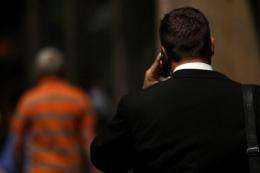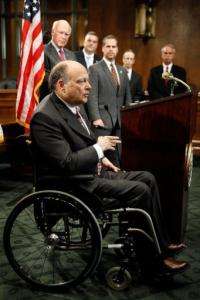Law enforcement officials and civil liberties advocates clashed Thursday at a US congressional hearing on a proposed law to protect the "location privacy" of people using mobile phones.
Law enforcement officials and civil liberties advocates clashed Thursday at a US congressional hearing on a proposed law to protect the "location privacy" of people using mobile phones.
A House of Representatives panel called the hearing on the Geolocational Privacy and Surveillance Act, aimed at protecting people from being tracked by police through their phones without a search warrant, except in emergencies.
Catherine Crump of the American Civil Liberties Union welcomed the proposal and said it would help ensure constitutional rights against "unreasonable" searches.
"Americans' privacy rights are threatened by warrantless access to geolocational information, and history teaches that the executive cannot be counted upon to police itself," she told the committee.
The ACLU maintains that many police forces take advantage of the ambiguity in the law to track people without consent or probable cause of a crime.
"Congress cannot afford to wait any longer to enact a warrant and probable cause requirement for location tracking," she said. "Today Americans' privacy rights are being violated routinely by invasive location tracking, particularly cell phone tracking."
But John Ramsey of the Federal Law Enforcement Officers Association said the law would tie the hands of police when they are investigating crimes or trying to catch criminals.
Joseph Cassilly of the National District Attorneys Association (seated), pictured in 2009, said the law "would hamper law enforcement's ability to quickly obtain important information that could be used to save lives."
"Who are we protecting with this legislation? The innocent or the criminals?" he said.
"Do we really want to slow down the apprehension of murderers and rapists so they can build their trophy wall by increasing the amount of legal documents necessary to gather information?"
Joseph Cassilly of the National District Attorneys Association said the law "would hamper law enforcement's ability to quickly obtain important information that could be used to save lives."
"Because so many cases are time sensitive in nature -- including child abductions, other forms of kidnapping and organized criminal and/or terrorist activities -- law enforcement must be able to work these cases without unnecessary administrative delay," Cassilly said.
But Ed Black of the Computer & Communications Industry Association backed stronger privacy protection, saying, "To cede to government the unchecked power to track you wherever you are is to lay the cornerstone of the surveillance state."
The US Supreme Court has held that the use of GPS devices placed by police on a suspect's car constitutes an "unreasonable search" under the constitution. But the question of cell phone tracking is still making its way through the courts.
Several members of Congress have introduced bills calling for "location privacy" to be respected by police, except in cases of emergency.
Privacy advocates say real-life police, like the ones on TV, often use phones to track suspects despite the murky legal situation. This could be limited if courts provide clearer rulings or if Congress passes legislation on "location privacy."
(c) 2012 AFP























